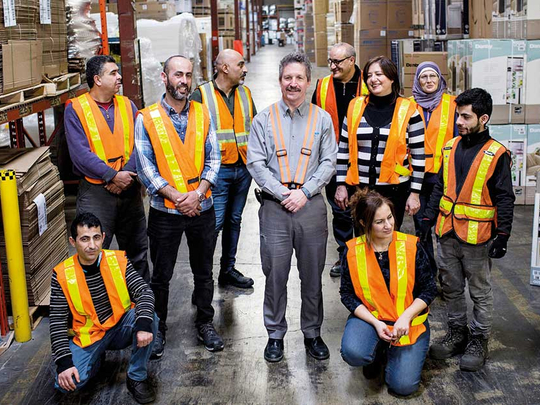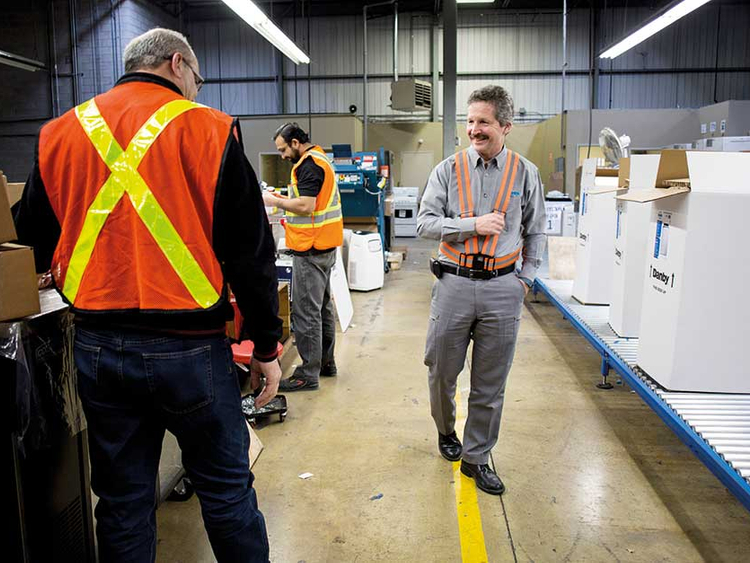
Toronto, Canada: Samantha Jackson and Farzin Yousefian had spent months planning a big traditional wedding. The caterer was booked, the venue arranged and everything looked set for the happiest day of their lives last September 2016.
But something happened, something that would change their lives and those of complete strangers — refugees from Syria.
“We were in the midst of wedding when that devastating photo of three-year-old Aylan Kurdi found on a beach came out, Jackson said. “Like so many other people, we became acutely aware of how bad the situation was getting and how important it was to act and do something positive, so we cancelled the wedding and redirected the funds.”
Instead, the Toronto couple donated their savings to help resettle Syrian families in the city. When the couple did eventually marry, they asked all of their friends and family to donate to resettling refugees. They opted to tie the knot at a small civil ceremony last October at Toronto City Hall.
The local refugee fund benefited by C$17,000 (Dh46,767) from the couple’s wedding day gesture.
In Canada’s smallest province, Prince Edward Island, the Seymour family had saved up C$2,000 for a family holiday. They never took the trip. Instead, the family donated it to the local Syrian refugee resettlement fund.
“We don’t always agree on everything, but the decision for us to put our holiday money toward this cause was the right one for us,” artist Amy Seymour told the local media at the time about her family’s decision. “Hopefully, together, we can prove that Canada in general and the Maritimes in particular are as generous and welcoming as the rest of the world thinks we are.”
By the end of January this year, according to the latest figures available from the Canadian government, 40,081 Syrian refugees have been welcomed into the country, with more than 365 local committees from coast to coast to coast helping raise funds to resettle those fleeing six years of civil war and Daesh terror.
And since the election of President Donald Trump in the US, the number of arrivals has only increased.
Employing Syrians
For all of the tales of generosity and sacrifices, children’s donations of pocket money, C$10 and C$20 notes, bake sales and community fund-raisers, charity car washes and gala fund-raising dinners, one man’s extraordinary efforts, energy and enthusiasm makes him stand out — so much so that he is being recognised as Canada’s Oskar Schindler.
Hollywood director Steven Spielberg brought the story to the big screen of the German industrialist who saved a thousand Jews of the six million murdered in the horrors of the Holocaust. In the quiet city of Guelph, about 90 kilometres northwest of Toronto, industrialist Jim Estill has so far managed to employ more than a hundred Syrians in his appliance factory. And he’s rallied the entire city around the Syrian refugee cause.
Some 200 families have been welcomed into the city of 130,000. And thanks to Estill’s energy, he’s built a network of more than 800 volunteers to organise every facet of making the Syrians, who have left everything behind, feel welcomed, settled and at home in the Ontario community.
Estill decided around 18 months ago to sponsor Syrian refugees fleeing their war-ravaged homeland. After doing the rough math, he estimated he could help bring a lot of Syrians to Guelph.
“I do it because I believe in doing the right thing,” he says. “And this is the right thing to do. You can’t stand by and do nothing.”
It was no mean feat, coming in at a cost of C$1.5 million. But he says the cascading events surrounding the war, coupled with a fear that he was not doing enough to help during a humanitarian crisis, prompted him to act.
Estill is a workaholic, regularly putting in 12-hour days into his business making washing machines and tumble dryers.
As he watched the news, 59-year-old Estill got worked up. “I didn’t want to be 80-years old and know that I did nothing during the greatest humanitarian crisis of my time,” he told Toronto Life.
He wanted to show how refugees could help enrich Canadian society. “I was trying to drown out the xenophobes.”
As Estill began to put his resettlement plans into practice, the local Islamic centre quickly became a close ally.
Despite a busy schedule of caring for three children at home, Sara Sayyed was one of the volunteers who lent a hand. Her deft organisational skills soon led Estill to make her the ‘director of directors’ for the fledgling volunteer group.
Before long, she was managing 800 volunteers.
“It’s definitely a full-time job,” she says.
Together, Estill and Sayyed realised that many refugees who arrive in Canada, after years of yearning for work and a steady income, need to learn English before venturing into the workforce.
“For many, it’s a difficult choice,” says Sayyed. “English class or getting a job. We asked ourselves — how can we do both?”
The pair decided to see what would happen if the entrepreneurial itch was scratched.
The result was a home-grown programme called Ease Into Canada — a way for refugees to earn a steady pay cheque at Estill’s warehouse and learn on-the-job English.
Estill trained the new arrivals, trying to place them as close to their field as possible, all with the added benefit of immersion in a language-rich environment. Most worked on the warehouse floor assembling packaging, but others found work in accounting or IT.
“You’re not trying to create dependency,” Estill says. “You’re trying to work people to independence.”
The refugees navigated the noises and language of the warehouse floor, learning to be careful of forklifts and how to use the machinery.
“I promised myself and my family, we are going do everything we can here and maybe somebody will help us,” says Ahmad of his first days in Guelph. Soon, he had a full-time job.
“When I started working, everyone knew me — I wasn’t a stranger. They knew my name. And right away, we are like brothers here. We work and we laugh together.”
Part of the success of the programme is location. For those fleeing the chaos of war, Guelph is a haven — a quiet city, often ranked as one of the best places in Canada to live. Companies are hungry for new talent and the refugees fill an economic gap. As the Syrians arrived, the community rallied and local storage space soon overflowed with donations.
Estill rented a nearby warehouse to deal with the logistics of the donations, and the help kept coming. Faith was no barrier either. “Our community has drawn together because of this,” Estill says. “I went to the churches, the mosque, the synagogue and the Sikh temple — every group has helped.”













